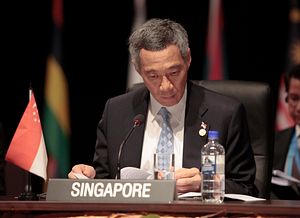As Singapore marks the 50th anniversary of its independence and the ruling People’s Action Party prepares for elections to be held before January 2017, there has been a lot of reflecting this year about the past and future of the city-state.
In that vein, Singapore’s prime minister Lee Hsien Loong delivered a lecture on June 30 outlining the country’s future challenges and how it might overcome them. In the lecture, which was part of the Ho Rin Hwa Leadership in Asia Public Lecture Series organized by Singapore Management University, Lee argued that Singapore’s main challenge would evolve depending on the time frame. Over a ten-year horizon, it would be the economy; in twenty-five years: demography; and in fifty years, identity.
Singapore’s most immediate challenge in the next ten years, Lee said, will be raising productivity to grow an already advanced economy. Per capita GDP has increased 13 times since independence, and the country’s level is now on par with Japan, the world’s third largest economy. But growth is slowing. Lee cautioned that if the city-state did not find a way to continue growing, it will stagnate and lose ground like some other countries including Taiwan, Korea and even Japan. That in turn could result in economic and social problems, including unemployment.
Maintaining growth, Lee said, can be achieved either through increased productivity or a larger workforce. Though relying more on the former is the more sustainable path for Singapore given rising concerns about the influx of foreign workers, over the past decade more than four fifths of Singapore’s annual growth of 5.8% has come from workforce growth rather than productivity growth. A reasonable goal, Lee said, would be for the country to strive for 4% growth, with half of that coming from productivity growth and the other half from workforce growth. To help achieve this, Lee said the government had launched SkillsFuture as a national movement to support Singaporeans in developing skills throughout their lives to become more resilient and adaptable.
In the next 25 years, Singapore’s challenge would be its aging and dwindling population. That is worrying, Lee said, because in the long run, “demography is destiny.” Singapore is already facing a dilemma in this respect, with its 2014 population growth rate (1.3%) the slowest in a decade. Lee argued these worries would only intensify in the next few decades. According to the latest statistics he cited, while every five working adults support one senior citizen in Singapore today, it will be two adults supporting one senior citizen by 2030. Looking further out to 2050, the country’s population pyramid would be inverted.
The solution, Lee said, would be for Singaporeans to marry and have more babies. He suggested that the country strive to get its total fertility rate up from 1.2 to 1.5, which is over 200,000 more babies born over 25 years. The government would do its part to facilitate this, including by helping young couples with housing, child-care and flexible work arrangements. But he also admitted that policies alone would not solve the problem because it also required a cultural change to become “a more family-friendly country.”
The long-term challenge in the next 50 years would be maintaining Singapore’s identity. Lee warned that if a large part of the country’s talent goes overseas and Singaporeans become divided at home along various social and economic fault lines – from income disparities to LGBT issues – the very idea of a Singaporean identity would be threatened.
Lee admitted that this sense of identity is something the government cannot create, but would be forged when citizens face adversity and celebrate success together. He cited examples of such events this year, including the death of Lee Kuan Yew in March as well as the recent SEA Games. These shared experiences, Lee said, reinforce the shared values that Singaporeans have in common – like meritocracy, multiracialism, justice and equality, and full and equal opportunities for all.
Ultimately, Lee said, Singapore’s ability to confront these challenges would depend not only on policies or circumstances, but responsible and committed leaders who can win the support of the people and rally the country together.
“And then, not only will our next generation enjoy a good life, but they will be able to look forward to a brighter future for themselves and for their children,” he said.

































